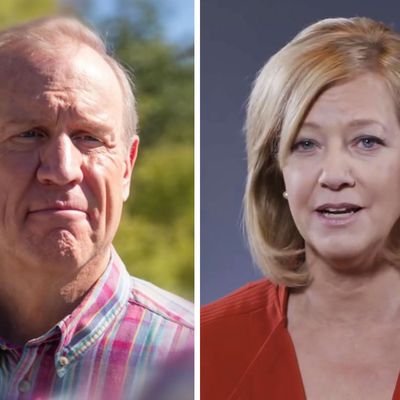
With all the focus on the battle for control of Congress in 2018, it’s easy to forget that at the top of the ballot in many places will be gubernatorial contests that will determine not only the political leadership of the states involved, but in many cases the landscape for congressional and state legislative redistricting in the decennial cycle that begins in 2021. With the nation’s governors gathering in Washington this weekend for their annual winter meeting, it’s a good time to remember their significance as part of the midterm election story.
There are 36 governorships up for grab in 2018, with 26 of them currently held by Republicans and just nine by Democrats (one is Alaska’s Democratic-aligned independent Bill Walker). So this election obviously holds great promise for Democrats to make gains, particularly if an anti-Trump turnout surge winds up lifting all donkeys.
But the landscape is complicated. FiveThirtyEight recently identified 18 Republican governorships that Democrats could feasibly flip if everything works out to their favor. But they also found seven Democratic governorships Republicans might win. While gubernatorial elections are affected by national trends — including the usual midterm reaction against the party controlling the White House and “wave election” turnout patterns — they have their own peculiar dynamics, particularly in the 20 states where incumbents are currently running for reelection.
And in this particular election year, there are a lot of primaries that could change the trajectory of the contests in which they are held. That is made most evident by one of the first, in Illinois, which will choose its gubernatorial nominees on March 20.
Initially this race looked like a war of big wallets between incumbent Republican governor Bruce Rauner and Democratic billionaire (and brother of former Commerce secretary Penny Pritzker) J.B. Pritzker. If they make it to the general election, the contest could eclipse the famous Jerry Brown/Meg Whitman 2010 California gubernatorial race as the most expensive in history. But both are now encountering serious intraparty challenges.
A dense cloud of negative vibes hangs over Illinois politics, much of it attributable to a long period of gridlock between Rauner and a Democratic-controlled legislature in which a constitutionally required budget was not enacted for more than two years. Finally, after the state’s bonds were in danger of being rated “junk bonds,” the legislature (with just enough Republicans joining Democrats) overrode a Rauner veto to enact a budget with an income-tax increase, and without the property-tax freeze and public-sector union restrictions the governor had demanded. But a lot of unpaid bills still hang over the state, and the legislature and governor remain at odds.
Rauner is not popular. His average approval ratio in the fourth quarter of last year (according to Morning Consult) was 31/55. But neither is his main nemesis in state politics, Democratic House Speaker Mike Madigan (a poll in March of 2017 placed his approval rating at 28 percent compared to Rauner’s 31 percent). One of the dynamics in the Democratic primary is in-fighting over connections with Madigan and other disreputable Democrats like imprisoned former governor Rod Blagojevich. A recent tape of Pritzker chitchatting with Blago back in the day and making sarcastic remarks about African-American pols is doing the front-runner some damage. And both his viable challengers, State Senator Daniel Biss and another famous rich guy, Chris Kennedy (son of RFK), are calling for Madigan’s resignation as state party chair in the wake of a sexual-harassment scandal in his office.
The Democratic candidate on the move at the moment seems to be Biss, who doesn’t have the financial means of his two rivals but does have some experience in office, and is now racking up endorsements from progressive groups, including National Nurses United, Move On, and Our Revolution, the organization of Bernie Sanders fans (Sanders himself is not making an endorsement in this primary). Several recent polls show Biss moving past Kennedy into second place. The wild cards are likely the African-American vote (the black candidate in the race, Tio Hardiman, is going nowhere fast) and the downstate vote; Pritzker’s money could keep him viable in both demographics in a battle with two other white guys from metro Chicago. There is no majority requirement in Illinois, so whoever finishes first on March 20 will be the nominee.
Rauner was thought to be an even more overwhelming favorite for his party’s nomination than Pritzker. But he has taken several recent steps that have enraged conservatives, including a deal to fund teacher pensions in Chicago, restrictions on the power of police to detain undocumented immigrants, and most of all, a flip-flop in favor of a bill to expand public funding of abortions. By last December National Review was calling Rauner “The Worst Republican Governor in America,” and a conservative challenger, anti-abortion state legislator and West Point graduate Jeanne Ives, began looking more serious.
Ives certainly isn’t pulling any punches. She’s already run one of the most obnoxious attack ads of this or any other cycle, accusing Rauner of being the candidate not only of baby-killers and union teachers and tax-hikers but of transgender people and “criminal” immigrants.
There haven’t been any polls taken since this nastygram hit the airwaves, but Rauner has reason to worry his early big lead over Ives might have shrunk. The question is whether he should spend some of the money he’ll need for a tough general election to beat back this conservative revolt.
The Illinois race definitely shows why early handicapping of gubernatorial races isn’t easy this year. A Biss/Rauner contest might look and feel a lot different than a Pritzker/Rauner contest, and if Ives somehow wins the GOP nomination, all bets are off. Check back on this one on March 21.






























